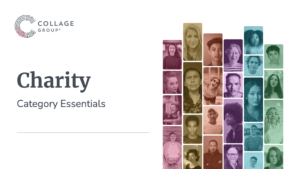Boomers Donate to Religious and Child Health Causes; Men Lead in Charitable Donations

Our latest charitable giving research unveils insights by age and gender.
This blog includes a small sample of the deep cultural intelligence available to our members. Contact us to learn how you can unlock full access to our cultural intelligence engine.
Two new Collage Group studies exam charitable giving across age and gender, revealing key cultural trends for organizations to act on to enhance charitable donations.
The first study takes a look at charity from the perspective of age – analyzing Gen Zers, millennials, Gen Xers, and boomers – assessing how each group donates its time and money.
Among other details, the findings reveal that boomers and Xers tend to center their contributions toward national or locally focused charity organizations. However, younger generations, especially those who make up the Gen Z segment, are more prone to donate to international aid orgs and causes.
This post includes a small sample of the deep cultural intelligence that fuels growth for our members. Contact us to unlock more content like this.

“Our research shows that younger Americans may put forth less money in terms of their charitable efforts, but they emphasize volunteering and fundraising instead,” said Jack Mackinnon, Collage Group senior director of cultural insights.

The study also finds that, generally, consumers rely on an organization’s website when looking to learn or obtain information about a given charity. In addition to online details, older Americans also rely on reviews. Conversely, those in the younger age groups prefer to ask friends and family when seeking charitable giving details.
When asked about which types of charities and nonprofits they have supported over the last year, 67% of Gen Xers and 67% of boomers said they donated to local or community focused causes.
Moreover, older generations stated that they most commonly support nonprofits through one-time donations. For younger, Americans however, they prefer to volunteer their time to charities and nonprofits. Forty-three percent of Gen Z answered that they volunteer time and 23% of millennials said they contribute to nonprofits and organizations by fundraising.
The second report from Collage Group, while also maintaining a focus on charity, measures giving by gender.
The study finds that men lead the general population in charitable donations. Men are more receptive to solicitations from others, including those from friends, family, and influencers, as well as solicitations via the telephone and email marketers.
Women, the research shows, are more likely than men to say a lack of money prevents them from donating.
“Women are inclined to volunteer and make in-kind contributions in order to make a difference,” says Mackinnon.
He adds that women generally focus more on animal and children’s wellbeing, particularly if the cause or issue is local, or community-based.

When asked how they have or how they would support a charity or nonprofit organization, 56% of women said they have or would donate items such as food, clothing, or an old vehicle. Both women at 46%, and men also at a rate of 46%, said they would make a one-time donation. Thirty-one percent of men said they would lend support by volunteering their time, and 18% of men said they would participate in fundraising.
Over the past year, men were more likely than women to make a charitable donation. When seeking information on a charitable cause or nonprofit, women are more likely to learn about the cause via a website or word of mouth.
Contact us to learn how you can unlock full access to our cultural intelligence engine.